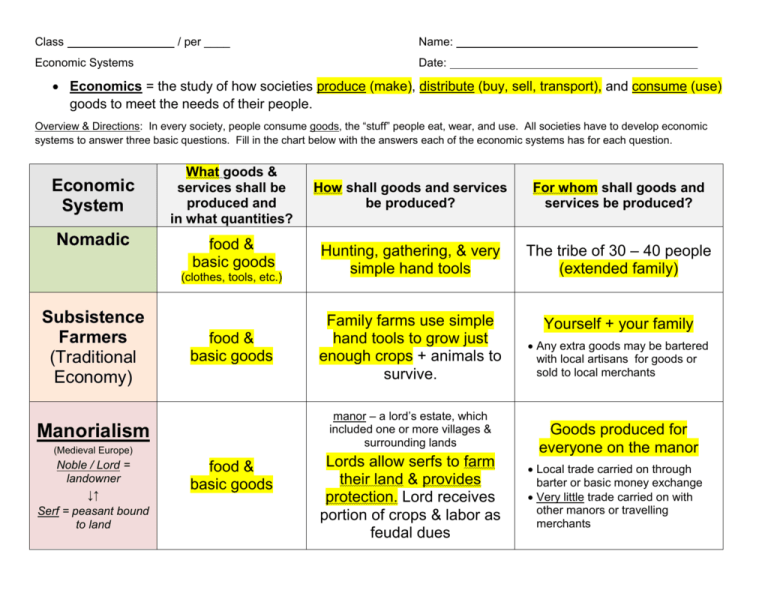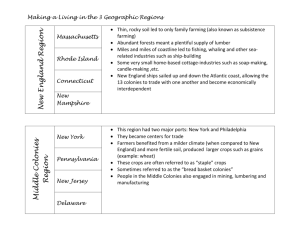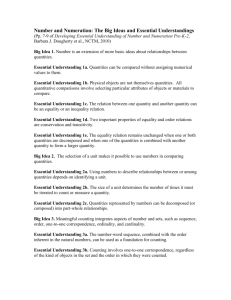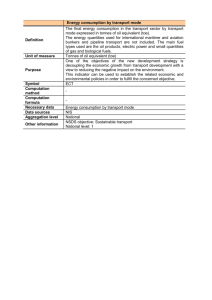Class / per ____ Name: Economic Systems Date: Economics = the
advertisement

Class / per ____ Economic Systems Name: Date: Economics = the study of how societies produce (make), distribute (buy, sell, transport), and consume (use) goods to meet the needs of their people. Overview & Directions: In every society, people consume goods, the “stuff” people eat, wear, and use. All societies have to develop economic systems to answer three basic questions. Fill in the chart below with the answers each of the economic systems has for each question. Economic System Nomadic What goods & services shall be produced and in what quantities? How shall goods and services be produced? For whom shall goods and services be produced? food & basic goods Hunting, gathering, & very simple hand tools The tribe of 30 – 40 people (extended family) Family farms use simple hand tools to grow just enough crops + animals to survive. Yourself + your family (clothes, tools, etc.) Subsistence Farmers (Traditional Economy) food & basic goods manor – a lord’s estate, which included one or more villages & surrounding lands Manorialism (Medieval Europe) Noble / Lord = landowner ↓↑ Serf = peasant bound to land food & basic goods Lords allow serfs to farm their land & provides protection. Lord receives portion of crops & labor as feudal dues Any extra goods may be bartered with local artisans for goods or sold to local merchants Goods produced for everyone on the manor Local trade carried on through barter or basic money exchange Very little trade carried on with other manors or travelling merchants Economic System What goods & services shall be produced and in what quantities? How shall goods and services be produced? For whom shall goods and services be produced? Colonies = raw materials Colonies seen as possessions of European country & forbidden to trade with other nations Mother country makes profit and gains benefits not enjoyed by colonists (16th – 19th century Europe) (sugar, tobacco, furs, lumber, etc) Colonies = plantations produce cash crops + other raw materials use of colonies for trade to make a profit European (mother) country = manufactured goods European (mother) country = produces manufactured goods (early factories develop) “free market” Food, raw materials, basic goods, manufactured goods produced in mass quantities for sale on the “open market” Mercantilism Capitalism (16th – 21st century) Businesses are owned individually and run for profit (19th – 21st century) Big businesses are owned by society as a whole and directed by the government for benefit of everyone equally Farmers and business owners hire workers to produce goods as cheaply as possible. Quantities & prices of goods determined by supply & demand Ownership by whole society “command economy” Communism Private Ownership Food, raw materials, basic & manufactured goods produced in manner directed by government in quantities determined by government (quotas). Government directs large businesses, factories, railroads, etc., determining how, where, and by whom goods are produced by setting quotas. Qualities & quantities of goods to be produced determined by government plan. Prices for basic goods set by government. Individually owned businesses produce goods or services based on demand for goods, which are then sold for the greatest possible profit without government interference Goods and services produced for the society as a whole following a plan created by the government. Prices of basic goods are set at low levels to ensure that all citizens can afford them. Communist economies are usually run by dictatorships with only one political party (i.e. the Communist Party). Communist Party members receive privileges and have access to goods that regular citizens cannot get or afford Economics = the study of how societies produce (make), distribute (buy, sell, transport), and consume (use) goods to meet the needs of their people. Sumer inventions: PLOW WHEEL IRRIGATION LEVEES WRITING A FIEF is an estate that includes: Land Villages/building on the land Peasants to work the land A fief is given by the Lord to the Vassal. A CAPITALIST economy must have a DEMOCRATIC government to be successful. A COMMAND/COMMUNIST economy must have a TOTALITARIAN government to be successful. Domestication had to occur before an economy could switch to Traditional. Job Specialization – when a worker performs only ONE job and is proficient at it.








